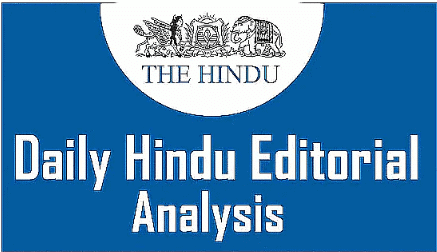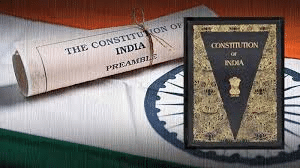UPSC Exam > UPSC Notes > Current Affairs & Hindu Analysis: Daily, Weekly & Monthly > The Hindu Editorial Analysis- 25th January 2025
The Hindu Editorial Analysis- 25th January 2025 | Current Affairs & Hindu Analysis: Daily, Weekly & Monthly - UPSC PDF Download

Foundational values, the journey of the Indian state
Why is it News?
The article discusses India's constitutional journey, focusing on the challenges of federalism, social democracy, and the need to protect core democratic values.
Introduction and the Significance of the Constitution
- India adopted its Constitution after extensive debate in the Constituent Assembly, taking nearly three years.
- The Republic officially came into existence on January 26, 1950.
- In his closing remarks on November 25, 1949, Dr. B.R. Ambedkar emphasized the challenges ahead, particularly questioning whether Indians would prioritize the nation over personal or community interests.
- These insights remain pertinent as we assess India’s progress and envision the future.
Federalism and Constitutional Discussions
- Recent events have sparked debates about India’s federal structure, particularly disputes between State governments and Governors escalating to the Supreme Court.
- Topics like simultaneous elections and the sidelining of regional languages have raised alarms about federal principles.
- Fiscal federalism is a contentious issue, with States navigating the complexities of the Finance Commission and the GST Act.
- The forthcoming delimitation exercise may further complicate the Union-State dynamic, especially for States that have managed to control their population growth.
- Although the term ‘federal’ is absent from the Constitution, Dr. Ambedkar clarified that the Centre and States are co-equal, except in times of emergency.
- Judicial rulings, starting with the S.R. Bommai vs Union of India (1994) case, have reinforced federalism as a fundamental aspect of the Constitution’s basic structure.
The Challenge of an Unequal Democracy
- The principles of liberty, equality, and fraternity are vital for India’s evolution as a social democracy.
- Critics contend that strict laws like the Unlawful Activities (Prevention) Act and the Prevention of Money Laundering Act contribute to the perception of a police state.
- Economic and social inequality remains a pressing issue, jeopardizing democratic principles.
- Dr. Ambedkar cautioned that inequality could undermine democracy and stressed the role of fraternity in bridging caste divides.
- Despite advancements through social and political movements, caste continues to impact merit and success, highlighting the need for ongoing efforts.
Protecting the Constitution
- Some groups advocate for replacing the Constitution with an Indic framework rooted in Hindu dharmic principles.
- Such proposals diminish the significance of the Constituent Assembly’s work and the nation-building efforts over the past 75 years.
- Rather than overhauling the Constitution, the emphasis should be on upholding democratic values and adhering to constitutional principles.
The Role of Constitutional Guardians
- Dr. Ambedkar’s vision underscores the necessity for individuals who prioritize the nation’s interests over personal gains.
- Judges, bureaucrats, politicians, activists, journalists, and citizens must act as custodians of democratic values.
- By fulfilling their roles, they can help realize the Constitution’s promises and ensure its lasting significance.
Conclusion
India’s journey over 75 years reflects both achievements and persistent challenges in upholding constitutional ideals.
Protecting democracy demands a shared commitment from all citizens and institutions.
The document The Hindu Editorial Analysis- 25th January 2025 | Current Affairs & Hindu Analysis: Daily, Weekly & Monthly - UPSC is a part of the UPSC Course Current Affairs & Hindu Analysis: Daily, Weekly & Monthly.
All you need of UPSC at this link: UPSC
|
44 videos|5271 docs|1113 tests
|
FAQs on The Hindu Editorial Analysis- 25th January 2025 - Current Affairs & Hindu Analysis: Daily, Weekly & Monthly - UPSC
| 1. What are the foundational values of the Indian state as discussed in the article? |  |
Ans. The foundational values of the Indian state include democracy, secularism, social justice, and the rule of law. These principles are essential for maintaining the unity and integrity of the nation, guiding its governance and ensuring the rights and freedoms of all citizens.
| 2. How has the journey of the Indian state evolved since independence? |  |
Ans. The journey of the Indian state since independence has been marked by significant political, social, and economic transformations. Initially focused on nation-building and unity, it has faced challenges such as communal tensions, regional disparities, and economic reforms, adapting its policies to address these issues while striving to uphold its foundational values.
| 3. What role does secularism play in the Indian state according to the article? |  |
Ans. Secularism plays a crucial role in the Indian state by ensuring that the government remains neutral in matters of religion and treats all citizens equally, regardless of their faith. This foundational value is vital for promoting harmony among diverse religious communities and maintaining the democratic fabric of the nation.
| 4. What challenges does the Indian state face in upholding its foundational values? |  |
Ans. The Indian state faces several challenges in upholding its foundational values, including rising communal tensions, political polarization, economic inequality, and threats to freedom of expression. These challenges require ongoing efforts to reinforce democratic institutions and promote social cohesion among different groups.
| 5. How can citizens contribute to the strengthening of the foundational values of the Indian state? |  |
Ans. Citizens can contribute to strengthening the foundational values of the Indian state by actively participating in democratic processes, advocating for social justice, promoting secularism in their communities, and engaging in constructive dialogue. Educating themselves and others about these values also plays a significant role in fostering a more inclusive and equitable society.
Related Searches





















